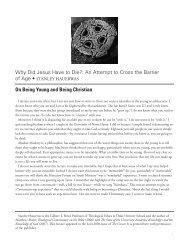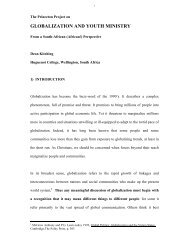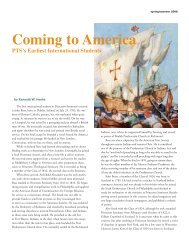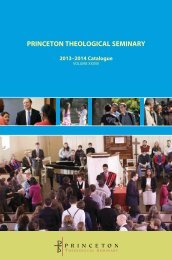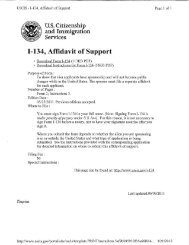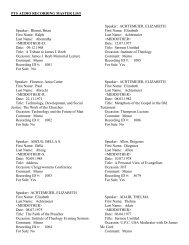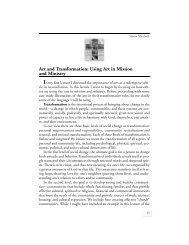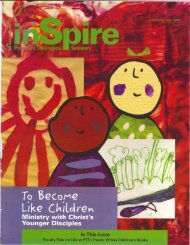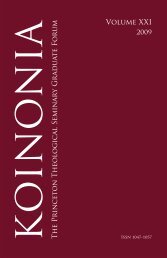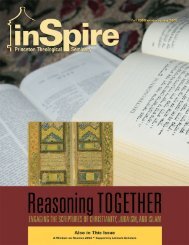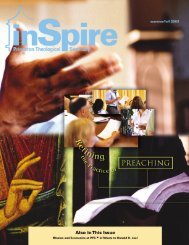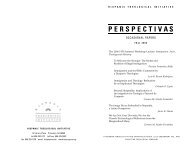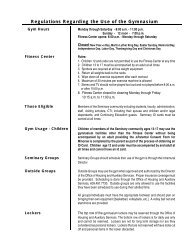Faculty - Princeton Theological Seminary
Faculty - Princeton Theological Seminary
Faculty - Princeton Theological Seminary
You also want an ePaper? Increase the reach of your titles
YUMPU automatically turns print PDFs into web optimized ePapers that Google loves.
PC5472 The Minister and Mental Illness<br />
Centers on selected mental or emotional illnesses, including depression, anxiety<br />
disorders, chemical dependency, schizophrenia, dementia and Alzheimer’s disorder,<br />
narcissistic personality disorder, and melancholia. Readings focus on autobiographical<br />
accounts by the afflicted person or a close family member. Attention<br />
is given to the minister’s role as a member of the health team and ways in which<br />
ministers may offer assistance to beleaguered family members. Minister’s own<br />
susceptibility to mental or emotional illnesses is also considered, with attention to<br />
warning signs. This course fulfills the pastoral care requirement. 3 credits.<br />
Fall Long Term, 2008–2009; Mr. Capps<br />
PC5475 Confession and Forgiveness in Pastoral Perspective<br />
Explores theological and psychological dynamics of repentance, confession,<br />
forgiveness, and reconciliation in relation to God, self, and others. The genre of<br />
autobiography as confession of faith and of sin, an examination of penitential rites<br />
in church history, and contemporary studies of shame, guilt, self-revelation, and<br />
forgiveness. Relevance to pastoral care of individuals, families, congregations, and<br />
communities will be considered throughout. This course fulfills the pastoral care<br />
requirement. 3 credits.<br />
Fall Long Term, 2009–2010; Mr. Dykstra<br />
PC5480 Compassionate Communication: A Spiritual Practice<br />
Based on Marshall Rosenberg’s model of nonviolent communication (NVC), this<br />
course will focus on basic skills and theological reflection related to developing<br />
compassionate communication in the church: listening with empathy, speaking<br />
honestly, mediating conflict, responding to criticism, working through congregational<br />
impasses, and building teamwork for common tasks. Experientially based;<br />
includes role plays, journaling, small group work, structured exercises. This course<br />
fulfills the pastoral care requirement. Pass/Fail only. 3 credits.<br />
Fall Short Term, 2008–2009; Ms. Hunsinger<br />
Fall Short Term, 2009–2010; Ms. Hunsinger<br />
Speech Communication in Ministry<br />
SC2101 Speech Communication in Ministry I<br />
Weekly workshops on speech communication in the context of ministry emphasizing<br />
critical and empathic study of biblical and other literature as encountered in<br />
the spoken word. Exploration of principles involved in perceiving and expressing<br />
denotative and connotative meaning through verbal, vocal, and physical gesture.<br />
Development of skill in technical, theoretical, and theological evaluation of one’s<br />
own work and the work of others. In addition to weekly workshops and required<br />
outside reading, required lecture-demonstrations may be scheduled live or by<br />
video at the discretion of the professor. Required of all junior M.Div. and M.A. candidates.<br />
Students are expected to remain in the same section both semesters for<br />
SC2101 and SC2102. Each section is limited to eight students. 1 credit.<br />
Fall Long Term, 2008–2009; Speech Staff<br />
Fall Long Term, 2009–2010; Speech Staff<br />
e 142 f<br />
cat0809




